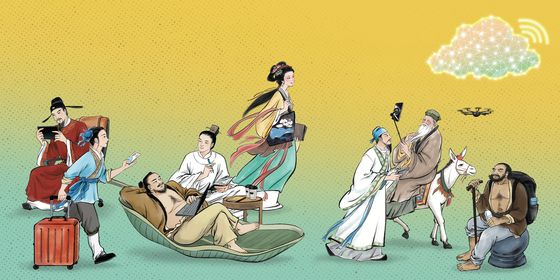Sayings about music, good and bad
Choice Chengyu is a regular column, examining interesting, unique or newsworthy examples of chengyu—four-character idioms or proverbs, derived from historical and mythical events.
June 21 is the World Music Day, which celebrates music in all its forms and the impact it’s had on the world and the human spirit. Music has existed for as long as mankind has found its voice, and every culture has its own distinguished music form. In China, when you talk about music, there are mangy chengyu you can use, and behind these idioms, you may find many interesting stories.
First of all, let’s start with two adjectives, which can be used to praise the beauty of music.
绕梁三日 Linger above the roof for three days
According to legends, in the Warring States Period, a woman named Han E went to the state of Qi by herself, and sang at the gate of the capital city, Linzi to make a living. Her songs were so beautiful that three days after she left, people in Linzi still felt that her voice lingering across the house. Then story was summarized into chengyu “绕梁三日(linger for three days in the air)” or “余音绕梁 (the sound lingers in the air even after the vocalist stops singing),” describing how unforgetable the music is.
响遏行云 The sound is so sonorous as to stop the passing cloud
Also in the Warring States Period, a man named Xue Tan learned singing from Qin Qing. Before he actually managed all the skills, Xue felt he had learned enough and decided to leave. His teacher didn’t stop him, but sang a sad song when he saw Xue off. According to the legend, when Qin sang the song, the trees in the forest were shaking, and passing clouds in the sky were stopped. Hearing this, Xue apologized to Qin, came back to continue learning from him, and never talked about leaving again all his life.
Now, this chengyu is used to depict clear, loud and resonant singing.
There are also idioms to refer to music in different forms or styles:
靡靡之音 Decadent music
Firstly mentioned in Han Feizi, an ancient Chinese text attributed to Legalist philosopher Han Fei in the Warring States period, this idiom was used to refer to music or song which appeals to depraved tastes. But the definition of the “decadent music” has been changing all the time. For example, in the 1970s and 1980s, famous Taiwan singer Teresa Teng’s popular songs were called “靡靡之音,” and were even banned in the mainland, though she was widely recognized as one of the most successful singers in the history of Chinese pop music today.
黄钟大吕 The Yellow Bell and Great Tube
Both the “黄钟 (Yellow Bell)” and the “大吕 (Great Tube)” were traditional Chinese musical instruments, but when they come together, the term can generally describle solemn, sonorous and grand music.
急管繁弦 Orchestral music with quick rhythm and rich melody
In practice, it does not necessarily refer to orchestral music in particular, but can depict a lively scene of different instruments playing together.
Of course, there are also some chengyu that originally describe music, but can also be used in other fields:
高山流水 Lofty mountains and flowing rivers
In the Spring and Autumn Period, when guyin master Yu Boya was playing a piece conveying the magnificence of high mountains, woodcutter Zhong passed by and acclaimed “Solemn and magnificent, just like Mountain Tai lofty in the cloudy sky!” Yu was so surprised and glad that he invited Zhong to listen to another piece, depicting the waves of rushing water. Again, after Yu finished, Zhong said “How surging and vast the water is! Just like the tempestuous river!” They then became good friends, and their story gave birth to the chengyu “高山流水,” which now describes the friendship between soulmates.
大吹大擂 Make a big fanfare
Originally meaning many instruments playing louldy at the same time, this chengyu now means “boast excessively.” For example, you can say:
Don’t brag when you have scored some modest achievement.
Búyào yǒu yìdiǎn chéngjì jiù dàchuī dàléi.
不要有一点成绩就大吹大擂。
异曲同工 Sing different tunes with equal skill
In the Western Han dynasty, both Sima Xiangru and Yang Xiong were famous for writing fu (a form of traditional Chinese poetry), but had different styles. So, Han Yu, famed literator in the Tang dynasy, used a metaphor to comment on them: “Sima Xiangru and Yang Xiong sang different tunes with equal skill.”
This chengyu also means “achieve the same goal through different approaches.” For example:
These two novels are equally good and have merits of their own despite their different approaches.
Zhè liǎng bù xiǎoshuō yìqǔtónggōng, gèyǒu qiānqiū.
这两部小说异曲同工,各有千秋。
弦外之音 Sound outside the strings
When you play stringed instrument, the music is normally generated by the strings. So, when the sound comes “outside” the strings, it no longer refers to the actual sound. This idiom refers to overtones, implication, or innuendo. For example, you can say:
No one failed to get the meaning behind his words.
Shéi dōu bù nán qīngchǔ tā de xiánwài zhī yīn.
谁都不难清楚他的弦外之音。
Cover image from VCG












